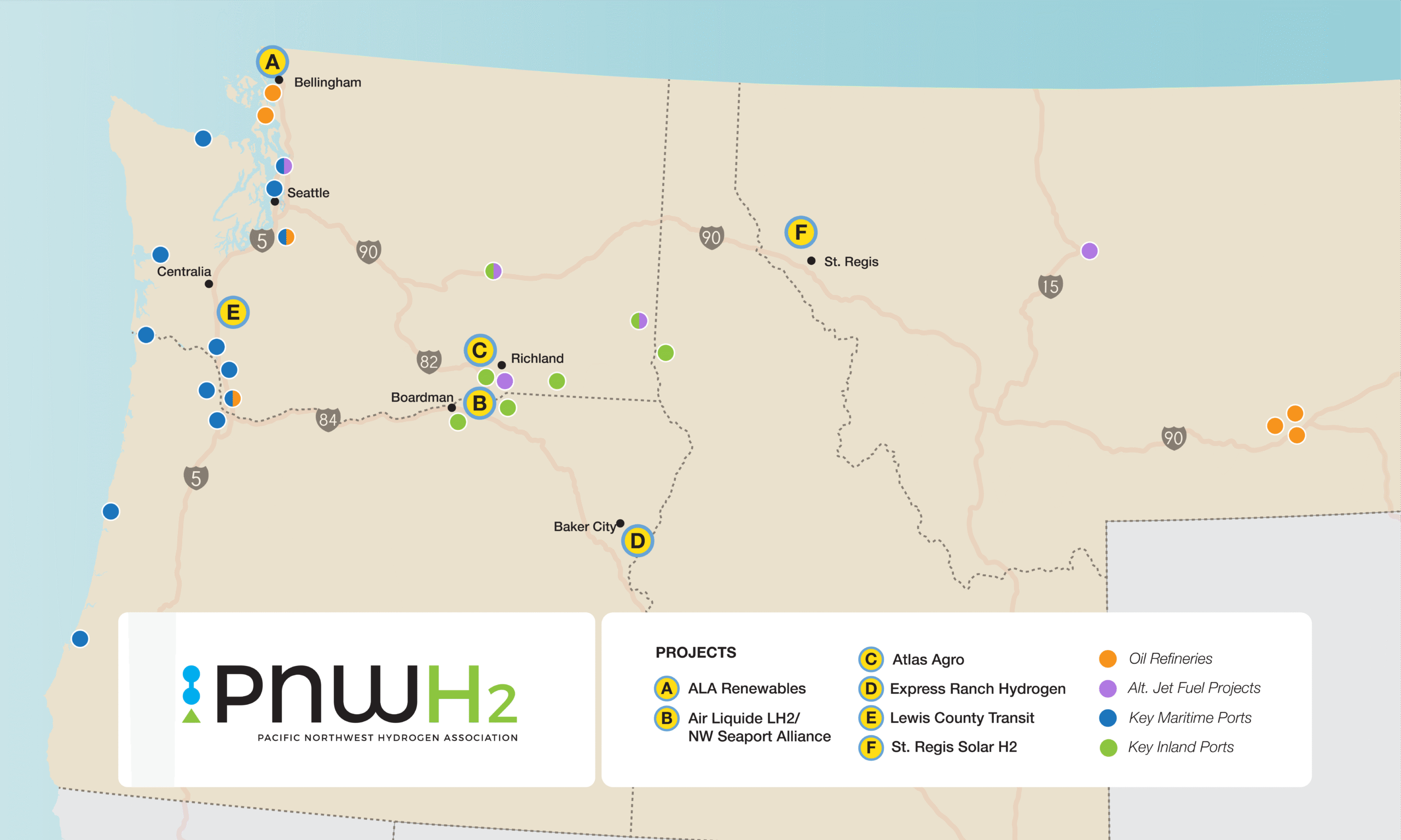The Pacific Northwest Hydrogen Association (PNWH2) is dedicated to establishing the Pacific Northwest as a leader in global energy innovation.

MISSION + VISION
Our vision is to create a hydrogen ecosystem across the Pacific Northwest that promotes job growth and improves the lives of people throughout the region.
The Pacific Northwest Hydrogen Association (PNWH2) is a multi-state nonprofit organization made up of public and private partners dedicated to establishing the Pacific Northwest as a leader in global energy innovation. We’re focused on revitalizing domestic manufacturing jobs and reducing reliance on foreign energy and goods through successful low-carbon intensity and economically viable hydrogen production.
The PNWH2 Hub expects to consist of project locations across Washington, Oregon and Montana. In partnership with labor, Tribal Nations, and public and private sector partners, the Hub will accelerate the deployment of hydrogen infrastructure to attract greater foreign and private investment and promote high-quality jobs throughout the region.
Our History
The U.S. Department of Energy’s (DOE) Regional Clean Hydrogen Hubs Program creates a national network of hydrogen producers, consumers, and connective infrastructure across America while supporting the production, storage, delivery, and end-use of hydrogen.
The H2Hubs aim to accelerate the commercial-scale deployment of clean hydrogen, helping to generate dispatchable power, create a new form of energy storage, and enable the development of domestic energy pathways across multiple sectors of the economy to serve as a central driver in the creation of good-paying jobs and improved energy security.
In October 2023, DOE selected seven hydrogen hubs throughout the country – including the PNWH2 Hub – to enter award negotiations following a comprehensive application process. In July 2024, PNWH2 received its Phase 1 Award designation from DOE. Phase 1 encompasses the first of four DOE-defined phases to ensure the PNWH2 Hub’s projects are technologically and financially viable, with federal approval required to proceed to subsequent phases.
Regional Investment
Hydrogen hubs are networks of regional hydrogen producers, consumers and nearby connective infrastructure like storage facilities and distributors. The Department of Energy’s H2Hubs program is designed to establish hydrogen hubs throughout the country.
Within a decade, the federal investment will help lower the cost of producing hydrogen in our region to enable the establishment of a network of production, storage and distribution systems and spur the investment and use of hydrogen in major industries – such as public transit, agriculture products, medium- and heavy-duty transport, and the electric power industry.
Furthermore, large-scale hydrogen fuel production could unlock additional investment in infrastructure and end-use applications, including public transit and trucking fleets, regional aircraft and ground support equipment, cruise ship refueling, hydrogen barges and ferries, and near-shore standby power for marine industries.
Strategic Priorities
Strategic Priorities for 2025–2026
- Readiness: Position PNWH2 and members to act quickly once funding is secured
- Advocacy: Clearly communicate regional needs to policymakers and funding agencies
- Transparency: Provide timely, clear, plain-language updates
- Resilience: Strengthen governance, planning, and contingency readiness
- Access & Opportunity: Keep tribal relations, labor, communities, and conservation efforts central to our mission
Goals
Goals for 2025–2026
- Strengthen Regional Hydrogen Ecosystem Readiness
- Maintain and grow our pipeline of eligible, high-quality projects
- Conduct structured Project Readiness Reviews to document barriers and technical needs
- Support members in navigating policy, permitting, and technology readiness challenges
- Advance Policy and Funding Advocacy
- Communicate urgency of timely match funding and federal clarity on 45V and Hub funding
- Develop and distribute plain-language policy updates for members
- Educate Washington, Oregon, & Montana’s Congressional delegations and state agencies on the hydrogen economy and Hub program for support
- Enhance Member Communication and Transparency
- Hold quarterly Member Updates (virtual/hybrid)
- Publish regular policy briefs and newsletters
- Maintain the PNWH2 website as a trusted, up-to-date source
- Build Organizational Resilience and Capacity
- Review and update governance, fiscal policies, and staffing plans for Phase 2 readiness
- Evaluate interim budget strategies given potential funding delays
- Prepare contingency plans for positive and negative Hub program outcomes
- Foster Partnerships Outcomes
- Continue voluntary outreach to Tribal Nations, labor groups, communities, natural resource stewardship organizations, and local governments
- Support early and ongoing stakeholder engagement best practices working with the Hub’s Stakeholder Engagement Lead, and Advisory Committee
- Identify grant or philanthropic opportunities to support workforce initiatives
PROJECTS
Demonstrating the use of hydrogen at-scale across industries.
The PNWH2 Hub’s proposed projects across Washington, Oregon, and Montana will demonstrate the use of hydrogen at scale as a safe and reliable energy storage and transfer medium, allowing intermittent electricity generation for peak energy delivery. The hydrogen will be converted to provide more suitable fuel for heavy-duty transportation and transformed into a vital industrial chemical feedstock to support domestic manufacturing.
To learn more about our projects and timeline, click here.